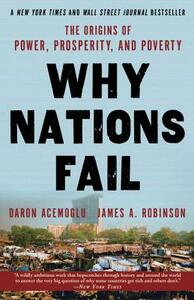You need to sign in or sign up before continuing.
Take a photo of a barcode or cover
694 reviews for:
Why Nations Fail: The Origins of Power, Prosperity, and Poverty
Daron Acemoğlu, James A. Robinson
694 reviews for:
Why Nations Fail: The Origins of Power, Prosperity, and Poverty
Daron Acemoğlu, James A. Robinson
- Would not do audio book again - too dense.
- could have been summarized into about 2 chapters.
- feel like it’s really oversimplified
- could have been summarized into about 2 chapters.
- feel like it’s really oversimplified
informative
medium-paced
informative
medium-paced
informative
reflective
slow-paced
An engaging reading on comparative politics and an excellent follow after the Predictioneer's Game by Bruce Bueno de Mesquita. If the latter one focuses on greed and best interests of self, the first one is all about the power of inclusive institutions, the environment, where everyone is a winner. To me, this is a perfect combo to understand why politics works the way it works: personal ego, greed and a very natural desire to be the best and acquire influence lead to exploitation of others - mentally, emotionally and financially. In my opinion, these are the roots of extractive institutions - when those in power extract and drain the nation's resources and capitals to have a fancy life.
Some argue that this book promotes neo-liberal approach to economics, but I disagree. The authors sound leftier than they intended to. The core of extractivity is exploitation, not matter of what type: mental, emotional, cultural economical or political. Thus, it must be ended. But there's always a seduction to top the extractive pyramid, and a danger the ones exploited become exploiters. The authors refer to this process as a vicious circle, and currently I live in a country that tries to break it. I am witnessing the attempts to develop a system of open access, without nepotism and crony capitalism. Right now, the existing system is fighting back.
The book proves the importance of incentives for people: well-established property rights, freedom of speech and encouragement for creativity and innovation. But to gain these the nation has to have the state rulers that have political will to grant them. I reckon it is super-difficult if you are the one to give up your privileges and power. So I am not surprised there's so much political and economical exploitation and suffering in the world.
Some argue that this book promotes neo-liberal approach to economics, but I disagree. The authors sound leftier than they intended to. The core of extractivity is exploitation, not matter of what type: mental, emotional, cultural economical or political. Thus, it must be ended. But there's always a seduction to top the extractive pyramid, and a danger the ones exploited become exploiters. The authors refer to this process as a vicious circle, and currently I live in a country that tries to break it. I am witnessing the attempts to develop a system of open access, without nepotism and crony capitalism. Right now, the existing system is fighting back.
The book proves the importance of incentives for people: well-established property rights, freedom of speech and encouragement for creativity and innovation. But to gain these the nation has to have the state rulers that have political will to grant them. I reckon it is super-difficult if you are the one to give up your privileges and power. So I am not surprised there's so much political and economical exploitation and suffering in the world.
informative
medium-paced
challenging
informative
slow-paced
informative
slow-paced
informative
slow-paced
